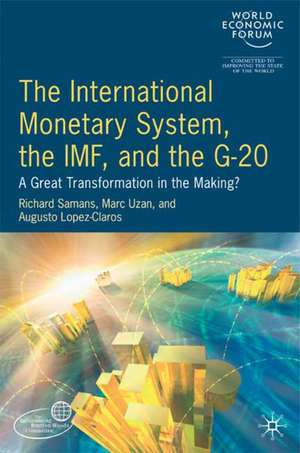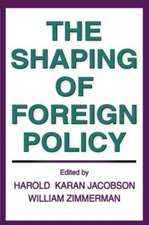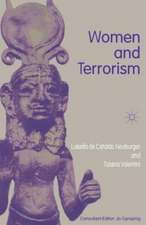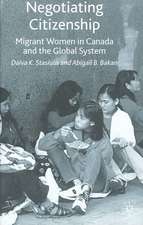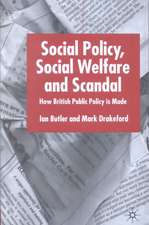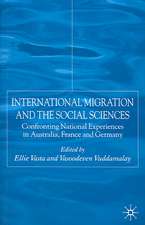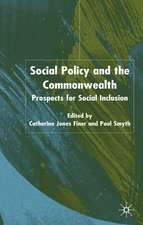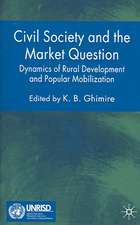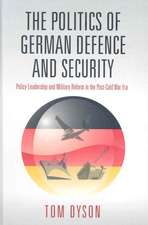The International Monetary System, the IMF and the G20: A Great Transformation in the Making?
Autor Richard Samans, Marc Uzan, Augusto López-Clarosen Limba Engleză Hardback – 22 ian 2007
Preț: 651.51 lei
Preț vechi: 766.49 lei
-15% Nou
Puncte Express: 977
Preț estimativ în valută:
124.69€ • 129.83$ • 105.37£
124.69€ • 129.83$ • 105.37£
Carte disponibilă
Livrare economică 17 februarie-03 martie
Preluare comenzi: 021 569.72.76
Specificații
ISBN-13: 9780230524958
ISBN-10: 0230524958
Pagini: 400
Ilustrații: 400 p.
Dimensiuni: 156 x 234 x 25 mm
Greutate: 0.73 kg
Ediția:2007
Editura: Palgrave Macmillan UK
Colecția Palgrave Macmillan
Locul publicării:London, United Kingdom
ISBN-10: 0230524958
Pagini: 400
Ilustrații: 400 p.
Dimensiuni: 156 x 234 x 25 mm
Greutate: 0.73 kg
Ediția:2007
Editura: Palgrave Macmillan UK
Colecția Palgrave Macmillan
Locul publicării:London, United Kingdom
Cuprins
PART 1: RECONSTITUTION OF THE INTERNATIONAL MONETARY SYSTEM What Prospects for the International Monetary System?; Patrick Artus What Should We Think About When Refounding the International Monetary System?; J. Bradford DeLong Reforming Bretton Woods to Promote World Harmony and Stability; Li Ruogu The US Current Account Deficit and the Future of the World Monetary System; Robert Skidelsky Implications of Structural Changes for Management of the Global Economy; Edwin M. Truman PART 2: NEW PLAYERS, NEW RESPONSIBILITIES: ASIA AND EMERGING MARKETS IN THE INTERNATIONAL MONETARY SYSTEM The BRIC Dream: An Update; Michael Buchanan Institutions to Promote Financial Stability: Reflections on East Asia and an Asian Monetary Fund; Gordon de Brouwer East Asian Economic Regionalism: Update; Masahiro Kawai The Role of ASEAN+3 in Regional Policy Surveillance in East Asia; Yung Chul Park The Internationalization of Markets for Local Currency Bonds; Philip Turner The Evolving Exchange Rate Regimes in East Asia; Yu Yongding PART 3: GLOBAL IMBALANCES AND THEIR IMPLICATIONS FOR THE INTERNATIONAL MONETARY SYSTEM Understanding Global Imbalances; Richard N. Cooper Remarks on Global Imbalances; Dietrich Domanski Global Imbalances: The New Economy, the Dark Matter, the Savvy Investor, and the Standard Analysis; Barry Eichengreen Ongoing Risks from the US Current Account Deficit; Brad Setser Domestic Investment and External Imbalances in East Asia; Jong-Wha Lee and Warwick J. McKibbin PART 4: A NEW IMF IN THE MAKING? Sixty Years After Bretton Woods: Developing a Vision for the Future; Jack Boorman Assessing the Future of the IMF: Its Role, Relevance, and Prospective Reform; John Lipsky Reforms of the International Monetary System; John Williamson The Future of the International Monetary Fund; Nouriel Roubini and Brad Setser Rethinking the IMF Business Model: Proposals for Assessment and Reform of the IMF's Medium-Term Strategy; Angel Ubide
Recenzii
The world economy has performed well over the past half century, indeed better than ever before, although not without some bumps. Will international monetary arrangements serve the world economy well in the coming decades? This volume addresses that vital issue, providing diagnoses and prognostications from diverse perspectives, along with suggestions for reform, varying from modest redirection to radical overhaul. A significant contribution to an important debate.Richard N. Cooper, Harvard University
Discussion on the reform of the international monetary system has revived in the past several years, stimulated by a new recognition of how important monetary relations are in the world economy and promoted by the analysis undertaken for the World Economic Forum. A selection of the papers written for this ongoing global dialogue are available in this volume to the general public, and display the scope of the issues and the eminence of many of the authors on whom the Forum has called. There could be no better way of remaining abreast of these issues than to ponder these pages. John Williamson, Peterson Institute for International Economics
This is an excellent volume that presents important new contributions to the debate on the reform of the international monetary and financial system. In addition to thoughtful analyses of the weakness of the current system, many contributions provide innovative ideas on how to reform the IMF and the international financial system, so it can deal with the challenges of real and financial integration in a globalized world. This is a high quality series of discussions, analyses, and reform proposals from leading academics, researchers, policy makers, and private sector participants. Nouriel Roubini, Stern School of Business and Roubini Global Economics
Discussion on the reform of the international monetary system has revived in the past several years, stimulated by a new recognition of how important monetary relations are in the world economy and promoted by the analysis undertaken for the World Economic Forum. A selection of the papers written for this ongoing global dialogue are available in this volume to the general public, and display the scope of the issues and the eminence of many of the authors on whom the Forum has called. There could be no better way of remaining abreast of these issues than to ponder these pages. John Williamson, Peterson Institute for International Economics
This is an excellent volume that presents important new contributions to the debate on the reform of the international monetary and financial system. In addition to thoughtful analyses of the weakness of the current system, many contributions provide innovative ideas on how to reform the IMF and the international financial system, so it can deal with the challenges of real and financial integration in a globalized world. This is a high quality series of discussions, analyses, and reform proposals from leading academics, researchers, policy makers, and private sector participants. Nouriel Roubini, Stern School of Business and Roubini Global Economics
Notă biografică
The World Economic Forum is an independent international organization committed to improving the state of the world by engaging leaders in partnerships to shape global, regional and industry agendas.
RICHARD SAMANS is Managing Director of the World Economic Forum's Centre for Public-Private Partnership, responsible for the Forum's public-private partnership initiatives and its relations with governments, international organizations, NGOs, and other non-business constituencies. Working at the Forum since early 2001, he directs the Forum's Centre for Public-Private Partnership and advises on the global issues program content of Forum meetings and other activities. Before joining the Forum, he served as Special Assistant to the President for International Economic Policy in the US White House. As a senior member of the National Economic Council staff and Senior Director of the National Security Council's International Economic Affairs directorate, he assisted President Clinton on abroad range of international trade and financial policy matters. Previously, he served as Economic Policy Advisor to former US Senate Democratic Leader Tom Daschle (D-SD), assisting him and the Senate Democratic Caucus on international trade and financial, fiscal, and other economic policy issues. Rick started his career as an international banker and has served in a number of additional capacities in government, the private sector and research institutions.
MARC UZAN is the Executive Director of the Reinventing Bretton Woods Committee, an organization which he founded in 1994. The Committee is a think-tank focusing on issues related to international financial architecture through a regular dialogue between markets and governments. He also coordinates the activities of the Euro50Group. He is editor of a number of prominent publications, including Financial System Under Stress - A Nex Architecture of the World Economy (1996), Private Capital Flows in the Age of Globalisation (2000), Capital Flows without Crisis?(2001), The Future of the International Monetary System (2004), and a handbook on the international financial architecture with Nouriel Roubini. He is the author of several academic papers on the new architecture for the international financial system. He has been a visiting scholar at the Department of Economics of the University of California, Berkeley.
AUGUSTO LOPEZ- CLAROS has been Chief Economist at the World Economic Forum since 2003, and Director of its Global Competitiveness Program, a research project whose aim is to determine the impediments to economic growth in more than 120 countries. In this capacity he has engaged senior policymakers in government and the business community on the policy and institutional requirements associated with improvements in the investment climate. Before joining the Forum, he was Executive Director and Senior International Economist with Lehman Brothers International inLondon. Earlier he was in the staff of the International Monetary Fund in Washington, serving from 1992 to 1995 as Resident Representative in the Russian Federation. He received a Ph.D. in economics from Duke University (USA), and a degree in mathematical statistics from Cambridge University, England. He is a frequent commentator on economic and financial issues, having given over 150 interviews during the last seven years on all the major networks. He has written extensively on a broad range of economic and financial issues, including those affecting transition economies, aspects of economic integration and development challenges confronting emerging markets. He has an abiding interest in the growth and development of global interdependence and cooperation and the importance of international institutions in their principal role of promoting and safeguarding human prosperity.
RICHARD SAMANS is Managing Director of the World Economic Forum's Centre for Public-Private Partnership, responsible for the Forum's public-private partnership initiatives and its relations with governments, international organizations, NGOs, and other non-business constituencies. Working at the Forum since early 2001, he directs the Forum's Centre for Public-Private Partnership and advises on the global issues program content of Forum meetings and other activities. Before joining the Forum, he served as Special Assistant to the President for International Economic Policy in the US White House. As a senior member of the National Economic Council staff and Senior Director of the National Security Council's International Economic Affairs directorate, he assisted President Clinton on abroad range of international trade and financial policy matters. Previously, he served as Economic Policy Advisor to former US Senate Democratic Leader Tom Daschle (D-SD), assisting him and the Senate Democratic Caucus on international trade and financial, fiscal, and other economic policy issues. Rick started his career as an international banker and has served in a number of additional capacities in government, the private sector and research institutions.
MARC UZAN is the Executive Director of the Reinventing Bretton Woods Committee, an organization which he founded in 1994. The Committee is a think-tank focusing on issues related to international financial architecture through a regular dialogue between markets and governments. He also coordinates the activities of the Euro50Group. He is editor of a number of prominent publications, including Financial System Under Stress - A Nex Architecture of the World Economy (1996), Private Capital Flows in the Age of Globalisation (2000), Capital Flows without Crisis?(2001), The Future of the International Monetary System (2004), and a handbook on the international financial architecture with Nouriel Roubini. He is the author of several academic papers on the new architecture for the international financial system. He has been a visiting scholar at the Department of Economics of the University of California, Berkeley.
AUGUSTO LOPEZ- CLAROS has been Chief Economist at the World Economic Forum since 2003, and Director of its Global Competitiveness Program, a research project whose aim is to determine the impediments to economic growth in more than 120 countries. In this capacity he has engaged senior policymakers in government and the business community on the policy and institutional requirements associated with improvements in the investment climate. Before joining the Forum, he was Executive Director and Senior International Economist with Lehman Brothers International inLondon. Earlier he was in the staff of the International Monetary Fund in Washington, serving from 1992 to 1995 as Resident Representative in the Russian Federation. He received a Ph.D. in economics from Duke University (USA), and a degree in mathematical statistics from Cambridge University, England. He is a frequent commentator on economic and financial issues, having given over 150 interviews during the last seven years on all the major networks. He has written extensively on a broad range of economic and financial issues, including those affecting transition economies, aspects of economic integration and development challenges confronting emerging markets. He has an abiding interest in the growth and development of global interdependence and cooperation and the importance of international institutions in their principal role of promoting and safeguarding human prosperity.
